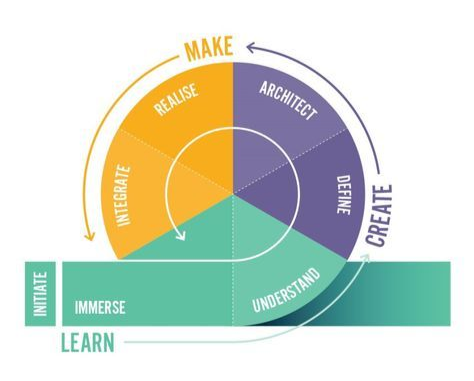Insights on innovating with purpose
July 17, 2023 | Read Time : 3 mins
Table of Contents
Introduction
In the fast-paced world of product design, having an experienced and knowledgeable product design manager is invaluable. These seasoned professionals possess a wealth of insights and expertise that can drive innovation, shape user experiences, and steer product development toward success. As an editor at McKinsey, I have had the privilege of collaborating with numerous product design managers. In this blog, I aim to share some of the most valuable insights I’ve gathered from these industry veterans. Join me as we delve into the secrets of their success and explore how their perspectives can transform how we approach product design.
Embrase a user-centric mindset
- Prioritize empathy: Successful product design starts with understanding the end users’ needs, pain points, and aspirations. Cultivating empathy allows the design manager to develop products that resonate with the target audience.
- Conduct thorough user research: Comprehensive user research enables a deeper understanding of user behaviors, preferences, and trends. Gathering insights early on helps design managers make informed decisions throughout product development.
- Iterate and test: Encourage an iterative design, prototyping, and testing approach. Regularly gathering user feedback and incorporating it into the design leads to user-centric products that meet and exceed expectations.
Foster effective collaboration
- Cultivate cross-functional partnerships: Collaboration with stakeholders from diverse engineering, marketing, and sales departments is crucial for successful product development. By fostering an environment of collaboration and open communication, design managers can harness the team’s collective expertise.
- Bridge the gap between design and business goals: Aligning design decisions with business objectives is essential. By effectively communicating the value proposition and ROI of design choices, design managers can garner project support and resources.
Adopt an agile mindset
- Emphasize rapid prototyping: Iterative prototyping helps validate design concepts early on and minimizes the risk of building products that fail to meet user expectations. By embracing a “fail fast, learn fast” mentality, design managers can refine and improve designs faster.
- Stay adaptable: In a dynamic market, flexibility is key. An agile mindset enables design managers to respond swiftly to changing customer needs, market trends, and technological advancements. This adaptability ensures that products remain relevant and competitive.
Leverage data and insights
- Harness analytics and user feedback: By analyzing data and gathering user feedback, design managers can gain valuable insights into user behavior, preferences, and pain points. This information informs design decisions and drives continuous improvement.
- Utilize user testing and A/B experiments: User testing and A/B experiments allow design managers to validate design choices and optimize the user experience. Data-driven decision-making enhances the chances of product success.
Emphasise design thinking
- Understand the problem: A seasoned product design manager understands the importance of identifying the core problem that needs to be solved. By conducting thorough research and engaging with stakeholders, they gain a holistic understanding of the problem space and can frame design challenges effectively.
- Ideate and explore possibilities: Encouraging a culture of imagination and exploration leads to innovative solutions. Design managers facilitate brainstorming sessions and design workshops to generate a wide range of ideas, fostering a creative and collaborative environment.
- Prototype and iterate: Rapid prototyping allows design managers to bring ideas to life quickly and gather feedback. By iterating on prototypes, they refine concepts and ensure that the final product addresses user needs effectively.
- Test and validate: Testing prototypes with real users helps validate assumptions, uncover usability issues, and fine-tune the design. Design managers gather qualitative and quantitative feedback through user testing, ensuring the final product is user-friendly and intuitive.

Foster design excellence
- Build a strong design team: A seasoned product design manager understands the importance of assembling a talented and diverse design team. They hire designers with a wide range of skills and expertise, fostering an environment of creativity and innovation
- Provide continuous learning opportunities: Design managers invest in the professional development of their team members. They encourage learning new design methodologies, tools, and techniques, keeping the team updated with industry trends and best practices
- Establish design systems and guidelines: Design managers create and maintain design systems that ensure product consistency and coherence. Establishing guidelines and design principles enables the team to work efficiently and maintain a unified brand experience
Stay abeam of emerging technologies
- Embrace technological advancements: A seasoned product design manager keeps a pulse on emerging technologies that enhance user experience. They explore opportunities in artificial intelligence, virtual reality, and voice interfaces, integrating these technologies seamlessly into their product designs.
- Understand the impact of technology on design: Technology profoundly impacts product design, and design managers must stay informed about its implications. They balance technological feasibility with user desirability and business viability to create innovative and impactful designs.
Advocate for design within the organisation
- Communicate the value of design: Design managers act as ambassadors, advocating for the importance of design within the organization. They articulate the strategic value of design in driving business success, customer satisfaction, and brand loyalty.
- Influence decision-making: Design managers actively participate in cross-functional discussions and decision-making processes. They present design insights and recommendations backed by research and user feedback, influencing key stakeholders to make design-led decisions.
A seasoned product design manager possesses a wealth of insights from years of experience in the field. By emphasizing design thinking, fostering design excellence, staying abreast of emerging technologies, and advocating for design within the organization, these managers can lead their teams to create exceptional products that resonate with users and drive business growth. In an era where customer experience is paramount, the role of a product design manager becomes increasingly crucial in shaping the success of organizations in a competitive landscape.






